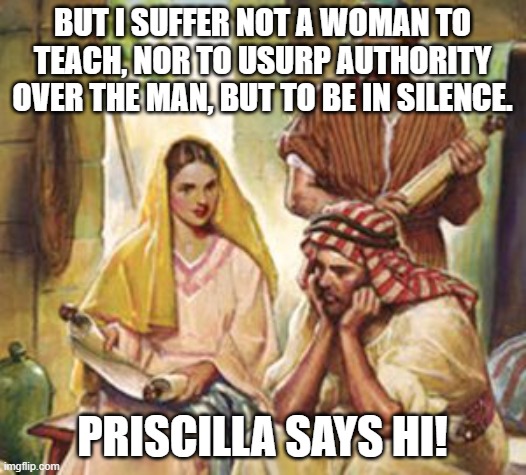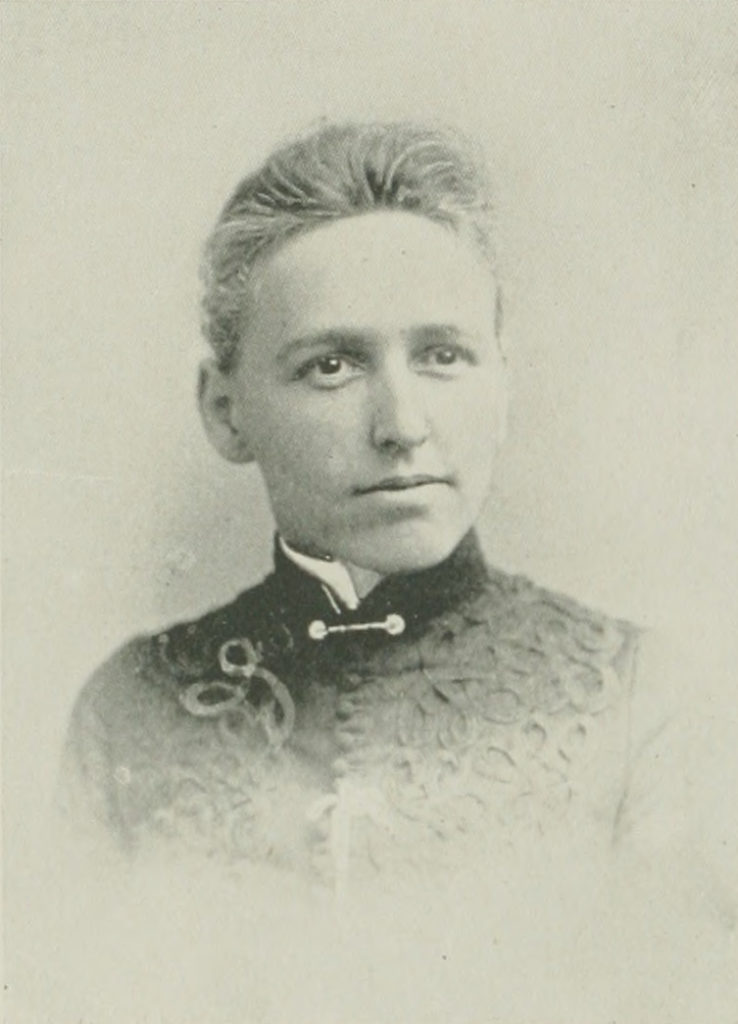For over 2,000 years, religion has blocked women from serving in the Body of Christ, often in opposition to God’s Will. Paul himself wrote concerning Believers and Spiritual Gifts, telling the Corinthian Church that ALL were given gifts, and everyone is placed in the Body as it pleases the Father. So with God in charge, everybody has a perfect place, and the Grace needed, for their God-given purpose. It does not matter the race, sex, or nationality of the person, every Believer has a place in the Body of Christ. And its not up to men, or organized religion to decide. It is God who decides where to place folks.
All these [gifts, achievements, abilities] are inspired and brought to pass by one and the same [Holy] Spirit, Who apportions to each person individually [exactly] as He chooses. For just as the body is a unity and yet has many parts, and all the parts, though many, form [only] one body, so it is with Christ (the Messiah, the Anointed One). For by [means of the personal agency of] one [Holy] Spirit we were all, whether Jews or Greeks, slaves or free, baptized [and by baptism united together] into one body, and all made to drink of one [Holy] Spirit. For the body does not consist of one limb or organ but of many. If the foot should say, Because I am not the hand, I do not belong to the body, would it be therefore not [a part] of the body? If the ear should say, Because I am not the eye, I do not belong to the body, would it be therefore not [a part] of the body? If the whole body were an eye, where [would be the sense of] hearing? If the whole body were an ear, where [would be the sense of] smell? But as it is, God has placed and arranged the limbs and organs in the body, each [particular one] of them, just as He wished and saw fit and with the best adaptation. -- 1 Corinthians 12:11-18 <AMP>
The Purpose Of Paul’s Letter To Timothy
By the time Paul wrote his letter to Timothy, the world was changing quickly. Rome had been largely indifferent to Christianity. It was a very small sect, with very little influence, at the very edge of the empire. And besides, most assumed it was a just sect of Judaism, and would cause little disruption to Roman power. But that wasn’t the case. Christianity was spreading all over the empire, especially among Gentiles living in the empires’ great cities. And it was in places like Ephesus, when the Word was preached, people heard it, and Believed in bunches. They saw the miracles, received the Holy Ghost, and were powerfully changed. Folks who had been involved in the occult publicly burned their religious books, worth over 50,000 pieces of silver. (Acts 19:18-20) Women, who were often silenced and treated as second-class citizens in the 1st Century, found Liberty in Christ and embraced it. Being made alive and placed in the Body of Christ was a transforming experience, and religious folks could not help but notice the changes, especially in the women.
Back in Rome, the ruling class definitely noted the impact. Christianity was not just another Jewish sect. On the contrary, Jewish leadership vehemently opposed it. Not only did Christians teach Jesus was the Messiah, they enjoyed freedom in Christ, especially the women. Pagans, seeing their numbers dwindle, their income shrink, and their customs condemned, opposed it. Even the craftsmen, who made trinkets and idols for Artemis (Diana), nearly started a revolt because so many people were turning to Christ. And Nero, encouraged by his Jewish proselyte wife, decided that Christians were just annoying enough to persecute them in the worst possible ways. Christians were a convenient scapegoat when Nero’s plans to remodel the city required Rome to be burned. And throughout the empire, Believers were put on notice that they were now considered a threat to peace.
Paul knew Ephesus very well. He understood Jewish Law, and through personal experience, their eagerness to persecute Christians. And from his time in chains for Christ, he understood the politics of Rome, and how the Empire’s attitude toward Christianity was rapidly changing under Nero. It is with this background in mind we can start to rightly divide Paul’s letter to Timothy. It must be first noted that this letter was addressed specifically to Timothy, not the church at Ephesus, or any other church. This should provide enough reasons to pause before attempting to apply everything in this letter to all churches, and for all time. Believers today certainly face demonic persecution, but not generally the type that would lead us to be made a flaming night light.
The second chapter of 1 Timothy starts with a clear message of being good citizens in a secular society. Praying for leaders, and those in authority, is recommended, because the result if they didn’t, might be deadly. While the promise if they did was a peaceful life. This flows into a few recommendations including that the Ephesian Believers should pray lifting up Holy Hands. This was done to appease the Jews, both the secret Judaizers, and converts who had not embraced their Liberty in Christ. It was not a universal mandate, but a suggestion for Ephesus at this day and time, hoping to keep the peace. In the same way, women were to “tone it down” in what they wore, and their behavior was to be quiet, and deferential to men. Again, this was to appease those people who were used to never hearing, or noticing women in public. By these suggestions, Paul hoped that the Ephesian Church could navigate Roman persecution, pagan accusations, and the influence of the Judaizers.
Why Did Rome Persecute Christians?
While Judaism was exclusive, with virtually no outreach to Gentiles, Christianity was aggressively expanding, desiring to share the Good News with the world. Most pagan religions put little effort into evangelism. Their growth often came through compulsion. Christianity was a choice, and a radical one at that. It offered fellowship with Love Himself, whose sacrifice set folks free.
In Judaism and much of the 1st Century world, most religious training and leadership positions were reserved exclusively for men. And women were generally seen as a necessary nuisance, often treated only slightly better than livestock. Jesus set women free. In the Body of Christ, there was no male or female. (Galatians 3:28) A Born Again Believer was a New Creation, complete in Christ, set free from all the religious hooey men design. The Liberty of Believers was quite appealing to people dead in sin and trapped in religious bondage.

The religious folks say, “Let the Law be burned rather than committed to a woman.” And, “He that teaches his daughter the Law, is as though he taught her to sin.” And finally, “Women should keep silent in churches.”
But God says, “There is no male and female; for you are all one in Christ Jesus.” And, “God places every member in the Body as it pleases Him.” And, “Let the redeemed of the Lord say so.” And finally, “My body is the Temple of the Holy Spirit.”
Christianity had many male converts, but the greatest growth came from women. Their departure created disturbances in homes, where men were supposed to dictate religious preferences for the family. Christianity did not discriminate, sharing the Gospel with everyone from the ruling class, to those living on the street. So all classes experienced the impact of women becoming Christians.
The very earliest years of Christianity may have been male dominated, but this changed quickly, as women took up many key roles throughout the Church. Paul himself listed many who were key players in various churches. It was female conversions, both in quantity and in their elevated status in their new faith, that caused Rome to take notice.
Greek philosopher Plutarch, a contemporary, expressed the attitude of many across the empire. Christianity was a disruptive force, especially impacting the home. Something needed to be done.
“A wife should have no friends but those of her husband; and as the gods are the first of friends, she should have no gods but those her husband adores. Let her shut the door, then, against idle religious and foreign superstitions. No god can take pleasure in sacrifices offered by a wife without the knowledge of her husband.”
Plutarch
Paul’s Advice To Timothy – And Contradictions
Consider Paul’s advice in light of Plutarch’s comments on the proper place for women when it comes to religion. His advice in Chapter 2 aligns quite well with appeasing Pagan and Jewish ideas about women. By toning it down, female Believers would not attract any unnecessary attention. The entire church could continue in peace, free from strife and persecution. Of course this would not be very helpful when it came to evangelism, as women were responsible for some of the greatest growth.

Let a woman learn quietly in entire submission. I allow no woman to teach, or to exercise authority over a man; but let her keep quiet.
— 1 Timothy 2:11-12 <CTNT>
Now let’s turn our attention to the infamous verse 12. How many women have had their Godly Calling, their place in the Body of Christ, thwarted by someone rabidly quoting this verse? We can understand why this might be helpful in a period of intense persecution, but it seems to be more severe than necessary, and a direct contradiction of Paul’s earlier teaching. For it was just a few letters back, in correspondence with the Corinthian church, that Paul strongly rebuked their leadership who were seeking his endorsement of their desire to silence women, which sounds very similar to 1 Timothy 2:11-12.
Question Regarding Women in the Churches “In your congregation” you write, “as in all the churches of the saints, let the women keep silence in the churches, for they are not permitted to speak. On the contrary let them be subordinate, as also says the law. And if they want to learn anything, let them ask their own husbands at home, for it is shameful for a women to speak in church.” What, was it from you that the word of God went forth, or to you only did it come? If any one thinks himself a prophet or spiritual, let him recognize that what I am now writing you is a command of the Lord. But if any one disregard it he will be disregarded. So, my brothers, be ambitious for the gift of prophecy, and speak not against the gifts of tongues. Let everything be done decently and in order. -- 1 Corinthians 14:34-40 CTNT
Paul had already answered the woman question in his letter to the Corinthian church. The Judaizers had written Paul suggesting that the Law declared that women were not permitted to speak, and must be dependent on their husbands for any religious instruction. It sounds very close to what Paul suggests in 1 Timothy 2:11-12. He quotes their suggestion, and then dismisses it. Paul certainly knew the Law, both the Commandments and the Oral Law – or religious traditions of the Jews better than most. And he knew they had no place in the Body of Christ. So we must dig a little deeper into 1 Timothy to see what Paul was advising Timothy to do, knowing that this was definitely not a universal commandment, but a reaction to the times. And one final nail, in a latter letter to Titus, Paul warns against “giving heed to Jewish fables, and commandments of men, that turn from the truth.” (Titus 1:14).
I mentioned earlier something that should be repeated, and probably emphasized. This was a letter addressed to Timothy, not the church at Ephesus. So its FOR, TO, and ABOUT Timothy. It is FOR us as modern Believers, but not written TO or ABOUT us. The salutation is partial evidence. And the letter itself refers to personal matters that have nothing to do with us. Paul writes Timothy, Use a little wine for the
stomach’s sake, and Bring the cloak, books, and parchments that I left at Troas with Carpus, – should modern Believers be imbibing wine and swinging by Troas? (1 Timothy 5, 2 Timothy 4:13) If those can be clearly seen as personal requests for a specific period of time, why not the other verses?
What about Paul’s marriage advice? Those who would block women from any meaningful leadership positions in the Body of Christ based on 1 Timothy 2:11-12, likely see no conflict with Paul when he writes, For I would that all men were even as I myself. And, I say therefore to the unmarried and widows, It is good for them if they abide even as I. (1 Corinthians 7:7-8) They would continue to marry folks and see no problem themselves getting married. And that would be the right thing to do based upon the context and the spirit of Paul’s letter. Paul was merely sharing his personal preference.
I Timothy 2:8-15 – Reimagined Based On Context and Without Male Bias
Verse 8. I desire that the men pray everywhere lifting up holy hands, without wrath and doubting, and the women likewise [or “in like manner”] Verse 9. [I desire women] to array themselves in a befitted catastola*, with reverence and restraint, not with braids, or gold, or pearls, or costly garments. Verse 10. But as becomes women proclaiming godliness, with good deeds. Verse 11. Let a woman learn, quietly, in all subjection [to God]. Verse 12. Now I permit a woman neither to teach nor exercise authority over a man, but let her be in quietness. Verse 13. For Adam was first formed, then Eve. Verse 14. And Adam was not deceived [when he sinned]; but the woman, having [first] been thoroughly deceived, became [involved] in the transgression [of Adam], Verse 15. And she will be saved by the Child-bearing [i.e., the bearing of Jesus Christ], if they abide in faith, and love and sanctification with self-restraint. 1 Timothy 2:8-15 - Translated By Katherine Bushnell, God's Word To Women *catastola - apparel suitable for Christian females
This was translated by Katherine Bushnell, a medical doctor, Christian writer, and Bible scholar during the 19th, and early 20th century. She was a student of both Hebrew and Greek, and when God called her to be a missionary preacher, she told God that if He would prove to her that Paul was not against women preaching, she would obey. Her lifelong quest was for biblical affirmation of the integrity and equality of women. God’s Word To Women is one of the best theological works on the proper place of women in the Body. Her translation and the background explanation in her book is hard to debate. However, I do believe we are still not quite to the core of what Paul is attempting to say. But she is a whole lot closer than before.

Supposing women only had translated the Bible, from age to age, is there a likelihood that men would have rested content with the outcome? Therefore, our brothers have no good reason to complain if, while conceding that men have done the best they could alone, we assert that they did not do the best that could have been done. The work would have been of a much higher order had they first helped women to learn the sacred languages (instead of putting obstacles in their way), and then, have given them a place by their side on translations committees.
Katherine Bushnell
(1855-1946)
Bible Confirmations Concerning Women As Ministers
Jesus approached and, breaking the silence, said to them, All authority (all power of rule) in heaven and on earth has been given to Me. Go then and make disciples of all the nations, baptizing them into the name of the Father and of the Son and of the Holy Spirit, Teaching them to observe everything that I have commanded you, and behold, I am with you all the days (perpetually, uniformly, and on every occasion), to the [very] close and consummation of the age. Amen (so let it be). -- Matthew 28:18-20 <AMP>
Is this just for men? Women were there throughout Jesus’ ministry, heard His Words, and received the anointing necessary to fill the place in the Body prepared especially for them.
Verily, verily, I say unto you, He that believeth on me, the works that I do shall he do also; and greater works than these shall he do; because I go unto my Father. And whatsoever ye shall ask in my name, that will I do, that the Father may be glorified in the Son. If ye shall ask any thing in my name, I will do it. If ye love me, keep my commandments. And I will pray the Father, and he shall give you another Comforter, that he may abide with you for ever; Even the Spirit of truth; whom the world cannot receive, because it seeth him not, neither knoweth him: but ye know him; for he dwelleth with you, and shall be in you. -- John 14:12-17 <KJV>
This whole passage could have been translated with “you, ye, or even she” as the pronouns. Instead, “he” was used for the first few verses. How many thousands of women throughout time read this passage and were persuaded that this was not for them? Believers are one in Christ. And what is meant for the Body, is meant for all members. Personalize this verse and own it. Whether a female or male, this belongs to all Believers.
And John answered and said, Master, we saw one casting out devils in thy name; and we forbad him, because he followeth not with us. And Jesus said unto him, Forbid him not: for he that is not against us is for us. -- Luke 9:49-50 <KJV>
Religion wants control. They want to pick and choose who is worthy to join their organization, and for most, women need not apply. It wasn’t long after the Apostles died, that religion took over. Church leadership evolved into a big business of ministers and priests. They created schools and career paths that initially favored men, and then excluded women. And they discovered Scripture that seemed to affirm their decision and harshly enforced it. Women who challenged their position in the church were often labeled a heretic or a witch. Best case they were banished, worst case they would be tortured until they confessed to whatever nefarious crime they were accused, and then murdered – legally of course. And what did Jesus say about people teaching and preaching His name outside His group? “He that is not against us is for us.”
Religion is quick to condemn. Anyone preaching and teaching outside the control or endorsement of their denomination is often labeled a heretic, or false prophet. But there is one point that many of these modern day Pharisees can agree on – women should not preach. And they would prefer to see the church crash and burn, rather than prayerfully and scripturally settle the matter with the Holy Spirit. Even if a female teacher or evangelist has tremendous success leading people to Christ, they somehow conveniently forget Jesus’ words in Luke 9:49-50. Tradition is strong. If Kermit The Hermit in 1143 wrote that churches should never have female ministers, that settles it. Superstition is stronger than Scripture. Tradition trumps Truth.
But you shall receive power (ability, efficiency, and might) when the Holy Spirit has come upon you, and you shall be My witnesses in Jerusalem and all Judea and Samaria and to the ends (the very bounds) of the earth. -- Acts 1:8 <AMP> And when they had entered [the city], they mounted [the stairs] to the upper room where they were [indefinitely] staying—Peter and John and James and Andrew; Philip and Thomas, Bartholomew and Matthew; James son of Alphaeus and Simon the Zealot, and Judas [son] of James. All of these with their minds in full agreement devoted themselves steadfastly to prayer, [waiting together] with the women and Mary the mother of Jesus, and with His brothers. -- Acts 1:13-14 <AMP> AND WHEN the day of Pentecost had fully come, they were all assembled together in one place, When suddenly there came a sound from heaven like the rushing of a violent tempest blast, and it filled the whole house in which they were sitting. And there appeared to them tongues resembling fire, which were separated and distributed and which settled on each one of them. And they were all filled (diffused throughout their souls) with the Holy Spirit and began to speak in other (different, foreign) languages (tongues), as the Spirit kept giving them clear and loud expression [in each tongue in appropriate words]. -- Acts 2:1-4 <AMP> Emphasis added
Jesus had completed His task on Earth. Now, it was time for His followers to take His place and spread the Good News to the World. But before they could be effective, they needed a heavenly empowerment, an anointing to do what God called them to do. And we see gathered with the Apostles, and the disciples of Jesus, women. Only Mary, the mother of Jesus is identified. There was no doubt Jesus had female disciples, but that number fluctuated depending on time and place. But whether its 5 or 10, the point is, they were part of Pentecost, and prepared for the ministry just like the men.
The Scripture says, No man who believes in Him [who adheres to, relies on, and trusts in Him] will [ever] be put to shame or be disappointed. [No one] for there is no distinction between Jew and Greek. The same Lord is Lord over all [of us] and He generously bestows His riches upon all who call upon Him [in faith]. For everyone who calls upon the name of the Lord [invoking Him as Lord] will be saved. [Joel 2:32.] But how are people to call upon Him Whom they have not believed [in Whom they have no faith, on Whom they have no reliance]? And how are they to believe in Him [adhere to, trust in, and rely upon Him] of Whom they have never heard? And how are they to hear without a preacher? And how can men [be expected to] preach unless they are sent? As it is written, How beautiful are the feet of those who bring glad tidings! [How welcome is the coming of those who preach the good news of His good things!] — Romans 10:11-15 <AMP>
There are nearly 8 billion people in the world. About 2.38 billion claim to be Christians. That leaves about 5.5 billion that have yet to hear the Good News and choose Jesus as their Savior and Lord. To attack these numbers, it is estimated that there are 5 million pastors/priests. That is not nearly enough to reach the world. Releasing women minsters would likely double the number of Christian leaders available for the ministry. What would Jesus do?
See Part 1 – Can A Woman Preach? – What Does The Bible Say?
Thank You For Visiting!
Image Source: Free Christian Clip Art
Stats Courtesy of Center For The Study Of Global Christianity and World Population Review.
God’s Word To Women – Katherine Bushnell 1923 Reprinted 1943 Public Domain



